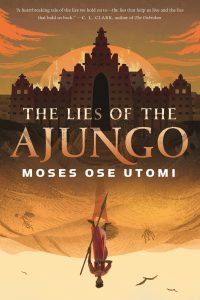Ian Mond Reviews Theory of Bastards by Audrey Schulman
 Theory of Bastards, Audrey Schulman (Europa Editions 978-1609454371, $18.00, 416pp, tp) April 2018.
Theory of Bastards, Audrey Schulman (Europa Editions 978-1609454371, $18.00, 416pp, tp) April 2018.
There’s quite a bit to chew on in Audrey Schulman’s magnificently titled Theory of Bastards. It’s a novel that tackles chronic pain, our reliance on technology, climate change, and the mating rituals of humans and bonobos. The thread that ties these issues together is the field of Evolutionary Psychology, the attempt to understand human nature through the lens of adaptation and natural selection. If that sounds a little dry and academic, fear not; the science is fascinating, the story is engaging, and the bonobos are extraordinary.
Schulman sets Theory of Bastards in a recognisable near future where most people are fitted with an implant, dubbed BodyWare, which accesses data and is networked to everyday items like doors, lights, and fridges. Technological advances have also mitigated (somewhat) the dramatic effects of climate change. Fresh fruits and vegetables are scarce, but these have been substituted with food that arrives hot off a printer. That said, for a good chunk of Theory of Bastards the science fictional elements are a background buzz to the main action of the novel – Francine Burk’s research into the mating practices of bonobos.
When we first meet Francine, known as Frankie, she is checking out The Foundation, a Great Ape sanctuary. She’s there because she’s hit the big time with the publication of a paper that proposes a controversial, feminist theory about sexual selection that sends evolutionary psychologists into a tizzy and transforms Frankie into a celebrity. If I’m a little coy about Frankie’s discovery, it’s because one of the delights of the novel is how Schulman walks us through Frankie’s thought processes, her early experiments, setbacks, and breakthroughs. Now that she’s a superstar, Frankie has her pick of scientific institutions. The Foundation is one of her many suitors, and while Frankie finds the administrator annoying, she is immediately drawn to the bonobos and their polyamorous attitude towards sex. Their willingness to couple with whomever is closer is at odds with the established theory that a female will mate with the strongest male. Intrigued and excited by what she might learn from the bonobos, Frankie agrees to a position at the institute. She immediately decides on a research assistant before one can be appointed for her, settling on a guy named David Stotts, the only person in a room full of scientists “who looked like he wanted to be someplace else, probably doing his work.” It’s an attitude Frankie appreciates.
For the most part, the narrative is centred on Frankie and David’s fascinating work with the bonobos. From time to time, though, Schulman travels back to the past to fill in Frankie’s backstory. We learn that a month after turning eleven Frankie experienced the first jolt of pain, deep in her gut, that will define her adult life. At the time her mother passed it off as menstrual cramps, but as Frankie grows older, as the pain worsens, as she finds herself regularly popping pain pills. As she struggles to convince a doctor that her agony is not caused by a bad period, she becomes disenchanted with the medical profession. It’s only when Frankie is admitted to the E.R. after a particularly horrible episode that a surgeon discovers endometriosis riddled throughout her body. Schulman’s handling of pain, and specifically how poorly women are treated compared to men when it comes to receiving a diagnosis, is part of a broader thesis which argues that the motivations of woman are regularly dismissed when evolutionary scientists consider the question of sexual selection.
This leads me then to the bonobos, the real stars of Theory of Bastards. Their willingness to use sex both for pleasure and for conflict resolution is eye-opening for an ignorant reader like myself. More than that though, Mamma, Goliath, Tooch, Houdina, and the other members of the clan are written with a great deal of love and passion. Even without the appendix at the back of the book, it’s clear that Schulman has taken great care to portray these brilliant, caring, and thoughtful animals accurately. And when in the final third of the novel the technology Frankie and David have taken for granted is no longer available, it’s the bonobos’ sense of community and togetherness that plays a vital role in keeping both humans alive. As much as I liked Frankie, as much as I sympathised with her pain, it’s the bonobos I fell in love with.
Having said that, I don’t want to reduce the novel to the asinine observation that bonobos can teach us how to live a better life (although I’m sure they can). Instead, Schulman’s exploration of debilitating pain, mating preferences, and the drawbacks of technology delivers an intimate, generous and thought-provoking novel that urges us to question the way we view social interactions, whether it’s sexual attraction or the establishment of healthy, compassionate, and fair-minded communities.
This review and more like it in the September 2018 issue of Locus.
 While you are here, please take a moment to support Locus with a one-time or recurring donation. We rely on reader donations to keep the magazine and site going, and would like to keep the site paywall free, but WE NEED YOUR FINANCIAL SUPPORT to continue quality coverage of the science fiction and fantasy field.
While you are here, please take a moment to support Locus with a one-time or recurring donation. We rely on reader donations to keep the magazine and site going, and would like to keep the site paywall free, but WE NEED YOUR FINANCIAL SUPPORT to continue quality coverage of the science fiction and fantasy field.







